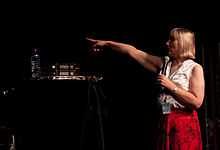Sophie Wilson
| Sophie Wilson | |
|---|---|
 Sophie Wilson giving a presentation on ARM development | |
| Born |
Roger Wilson 1957 (age 57–58)[1] Leeds, Yorkshire, England [2] |
| Residence | Lode, Cambridgeshire[3] |
| Nationality | British[4] |
| Institutions |
University of Cambridge Broadcom Acorn Computers |
| Alma mater | University of Cambridge[4] |
| Known for |
Acorn Computers BBC Micro ARM architecture[4] BBC BASIC |
| Notable awards |
Fellow of the Royal Society (2013) Computer History Museum Fellow (2012) [1] Fellow of the Royal Academy of Engineering (2009) |
|
Website www royalsociety | |
Sophie Wilson FRS FREng[5] (born Roger Wilson in Leeds, England, in 1957) is a British computer scientist. She is known for designing the Acorn Micro-Computer, the first of a long line of computers sold by Acorn Computers Ltd,[6] as well as the instruction set of the ARM processor.
Education
Wilson studied computer science and the Cambridge Mathematical Tripos at the University of Cambridge.[4]
Life and career
In 1978, she designed the Acorn Micro-Computer, the first of a long line of computers sold by Acorn Computers Ltd.[6]
In 1981, Wilson extended the Acorn Atom's BASIC programming language dialect into an improved version for the Acorn Proton, a microcomputer that enabled Acorn to win the contract with the British Broadcasting Corporation (BBC) for their ambitious computer education project, whereupon the Proton became the BBC Micro and its BASIC was developed into BBC BASIC. In 1983, she designed the instruction set for one of the first RISC processors, the Acorn RISC Machine (ARM), later to become one of the most successful IP cores (i.e., a licenced CPU core) of the 1990s and 2000s.
Wilson designed Acorn Replay, the video architecture for Acorn machines. This included the operating system extensions for video access as well as the codecs themselves, optimised to run high frame rate video on ARM CPUs from the ARM 2 onwards.
Wilson was a member of the board of the technology and games company Eidos plc, which bought and created Eidos Interactive, for the years following its flotation in 1990, and was a consultant to ARM Ltd when it was split off from Acorn in 1990.

Since the demise of Acorn Computers, Wilson has made a small number of public appearances to talk about her time there.[7]
Wilson is now the Director of IC Design in Broadcom’s Cambridge, UK office.[8] She was the Chief Architect of Broadcom's Firepath processor.[9] Firepath has its history in Acorn Computers, which, after being renamed to Element 14, was bought by Broadcom in 2000.
She was listed in 2011 in Maximum PC as number 8 in an article entitled The 15 Most Important Women in Tech History.[10] She was awarded the Fellow Award by the Computer History Museum in California in 2012 "for her work, with Steve Furber, on the BBC Micro computer and the ARM processor architecture."[11][12][13][14] In 2013 Sophie was elected as a Fellow of the prestigious Royal Society.[15]
Personal life
Her parents were both teachers, her father an English teacher, her mother a physics teacher.[2] Wilson is transgender.[16][17] In the BBC television drama Micro Men, a young version of her is played by Stefan Butler and Wilson herself makes a cameo appearance as a pub landlady.[17]
References
- ↑ 1.0 1.1 Sophie Wilson 2012 Fellow
- ↑ 2.0 2.1 http://archive.computerhistory.org/resources/access/text/2012/06/102746190-05-01-acc.pdf
- ↑ "Wilson's Website". Retrieved 1 January 2010.
- ↑ 4.0 4.1 4.2 4.3 "Sophie Wilson@Everything2.com". Retrieved 1 January 2010.
- ↑ "List of Fellows".
- ↑ 6.0 6.1 Russell, R. T. "A History of BBC BASIC". Retrieved 10 June 2007.
- ↑ "CU Computer Preservation Society 1998–1999". Cambridge University Computer Preservation Society. 29 August 2002. Retrieved 28 June 2011.
On 20th October 1998, Sophie Wilson spoke to an audience of 22 about Acorn from the BBC to the ARM.
- ↑ Murry, Sarah. "Broadcom Engineer Sophie Wilson Named Computer History Museum 2012 Fellow". Broadcom. Retrieved 22 May 2012.
- ↑ Smotherman, Mark. "Which Machines Do Computer Architects Admire?". Retrieved 22 May 2012.
- ↑ Bouman, Amber (1 March 2011). "The 15 Most Important Women in Tech History". Maximum PC. Retrieved 12 March 2012.
- ↑ Sweet, Carina (19 January 2012). "The Computer History Museum Announces Its 2012 Fellow Award Honorees". MarketWatch. Retrieved 30 January 2012.
today announced its 2012 Fellow Award honorees: [...] Steve Furber and Sophie Wilson, chief architects of the ARM processor architecture [...]
- ↑ "Fellow Awards - Sophie Wilson". Computer History Museum. Retrieved 30 January 2012.
- ↑ Williams, Alun (20 January 2012). "Four ARM cores for every person on earth – Furber, Wilson honoured". Electronics Weekly. Retrieved 7 March 2012.
- ↑ Murry, Sarah (19 January 2012). "Broadcom Engineer Sophie Wilson Named Computer History Museum 2012 Fellow". Broadcom. Retrieved 7 March 2012.
- ↑ http://royalsociety.org/people/sophie-wilson/
- ↑ "sufficiently advanced technology : the gathering". Need To Know. 25 January 2002. Retrieved 20 June 2010.
- ↑ 17.0 17.1 Williams, Chris (8 October 2009). "BBC4's Micro Men: an interview and review". Drobe. Retrieved 20 June 2010.
External links
| ||||||||||||||||||||||||||||||||||||